2022/09/17
EVENT&REVIEW
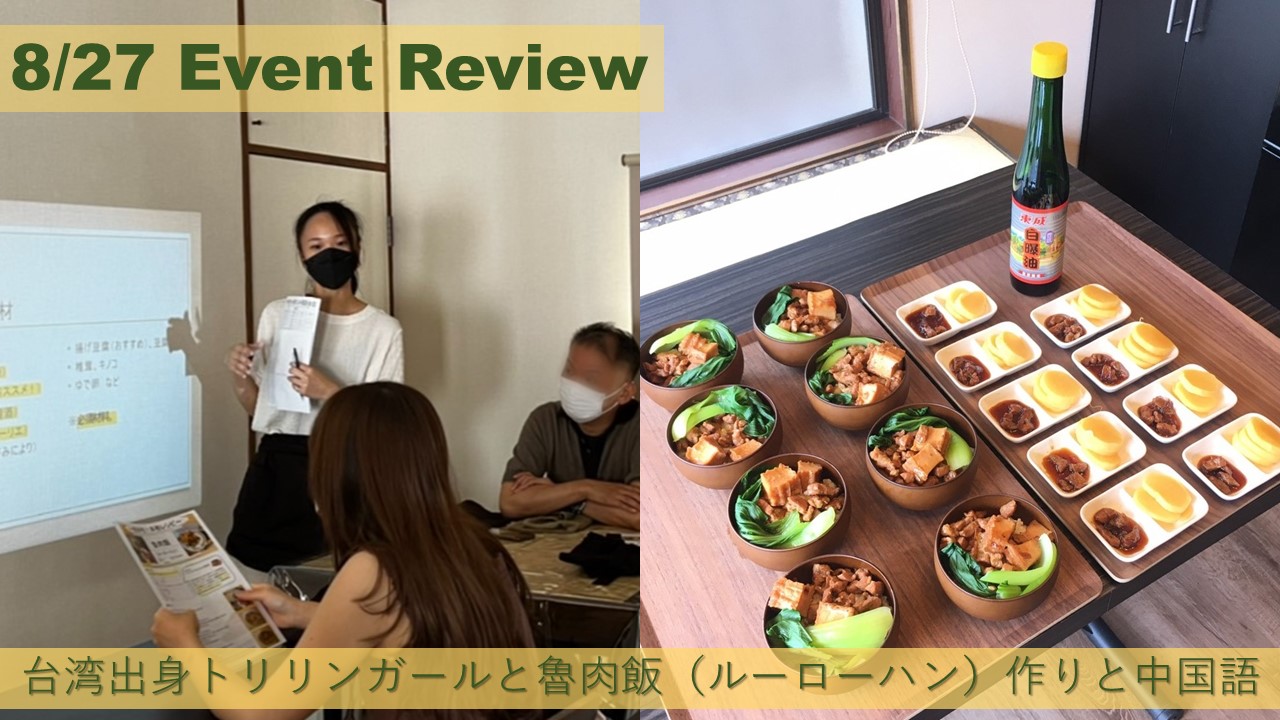
On August 27, 2022 (Sat), a workshop was held to learn Chinese while cooking and tasting a Taiwanese home-style dish called ” Lu Rou Fan ” together with Ms. Shi, a trilingual teacher from Taiwan.
There is a saying that “Eating out of the same pot.” and “Communication while drinking.” are such common phrases, that sharing food with others brings you closer and makes you feel closer to each other. This workshop was exactly like that, with a friendly atmosphere from start to finish, and it was an event bringing Taiwan closer to us.
Teacher Shi’s Interview:”世界を身近に”世界中の先生から学ぶインタビュー①台湾出身 シさん
Main flow of the workshop day is as follows.
1) Introduction of Dr. Shi & Participants’ Self-Introduction
2) Recipe Explanation
3) Cooking & Chinese Lesson
4) Tasting & Social

Ms. Shi graduated from Taiwan University with majors in Japanese language. (JLPT N1 & TOEIC score 750)
After working as a customer service representative at a hotel, she worked in the IT industry producing manuals related to robotics and AI, and participated in interpretation and system implementation projects for a Japanese company that is expanding globally.
Working as a bridge between countries all over the world.
Mr. Shi is a globally active teacher.
Why did Ms. Shi choose the “Japanese Department” at her university?
She says it was because she was so touched when she came to Kyoto on a family trip.
The touching experience was a moment that defined her life schedule.
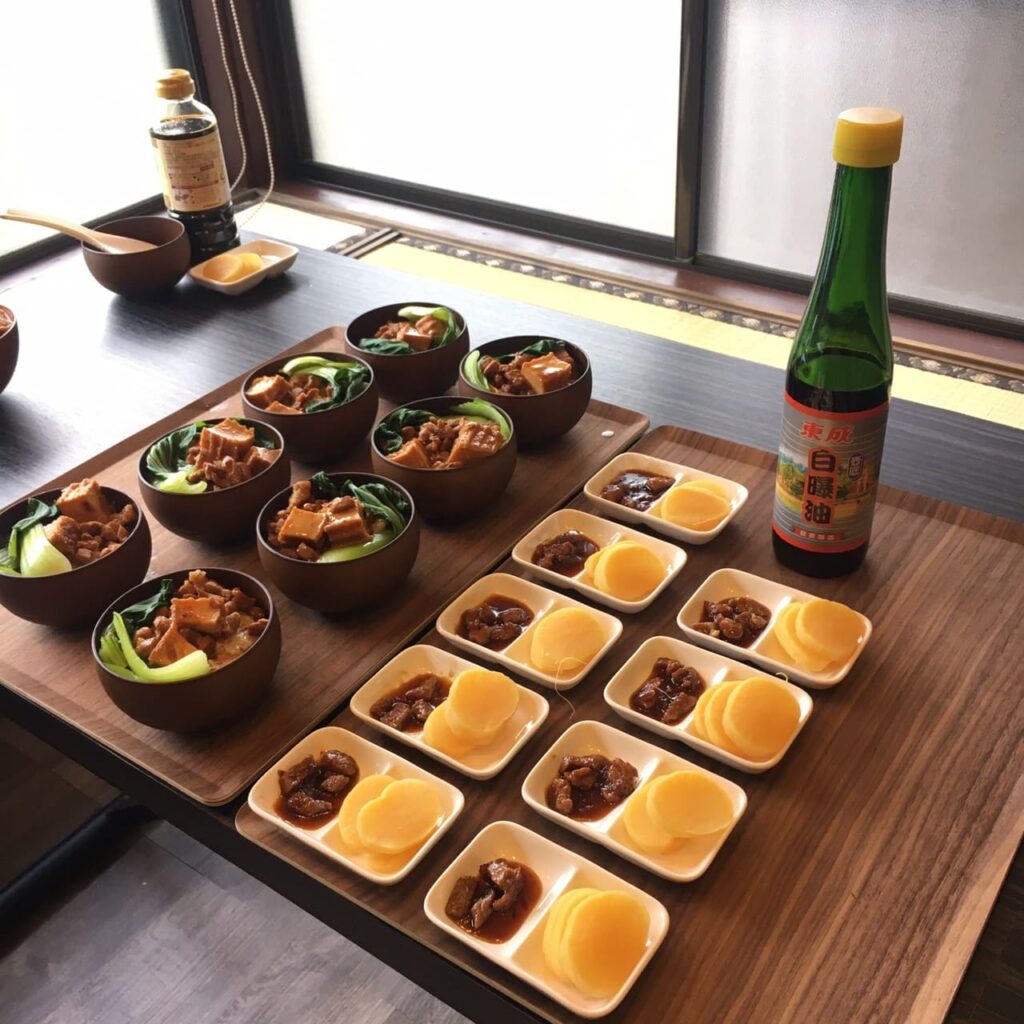
After introducing the teacher, we moved on to cooking, and while cooking, Ms. Shi gave us various pointers on how to make Lu Rou Fan tasty.
By the way, have you ever heard about “Lu Rou Fan”?
Lu Rou Fan is a dish similar to Japanese stewed pork cubes topped with rice.
Lu Rou Fan, a stewed dish, may seem brown and strong in flavor, but the taste was mellow.
But why?
The reason was related to Taiwan’s unique “soy sauce”.

Tip 1: Taiwanese Soy Sauce
Taiwanese soy sauce is sweet and not as salty as Japanese soy sauce. It is delicious!
It may be a little like Kyushu soy sauce, but sweeter and mellow.
Teacher Shi. says, “This Taiwanese soy sauce is the key point!”.
The Taiwanese soy sauce from the manufacturer that she brought with her was sent by her mother for this event, which was not sold in Japan.
We are glad that the teacher was so thoughtful as to bring something delicious to introduce Taiwanese food.(Taiwanese soy sauce itself can be purchased at overseas food stores.)
Although the dish made with Japanese soy sauce was delicious, but compared to Taiwanese soy sauce, it was better suited to the dishes.

Tip 2: Cook the Fatty Parts & Meat Parts Separately
Use pork meat(ribs) in Lu Rou Fan.
The point is to cook the fatty part and the meaty part separately!
First of all, remove excess fat from the meat and heating the fatty part well.
This process is to change the texture of the meat.
The fat that comes out can be saved and used in stir-fries and other dishes to enhance the flavor.
Tip 3: For Sweetness, Use Rock Crystal Sugar!
The point of the sugar is to use white rock crystal sugar!
That will make it mellow.
Glacial sugar is often used only to make plum syrup or fruit syrup.
However, when used in cooking, it gives a mellow finish, which was an eye-opening experience.
There are also many other points to make it tasty, such as adding black pepper and fried onions, depending on your preference.

The following are some of the comments we received after the workshop.→During the meat cooking, we had a chance to study with Chinese lesson prepared by the teacher.
As for Chinese, four tones are difficult, but we challenge it without hesitation first!
If you can’t say “I want to eat Lu Rou Fan.” or “It’s very delicious!” in Chinese, you won’t get to eat it.
Teacher suggested this rule for this workshop to encourage everyone to try it (lol).
For example, when traveling to Taiwan or China, or when speaking in Chinese, you will immediately use every day phrases in daily life or shopping.The Chinese conversation practice focused on phrases that you might use in your daily life or while traveling.Materials for the workshop were also written in English, which made it easier to understand.
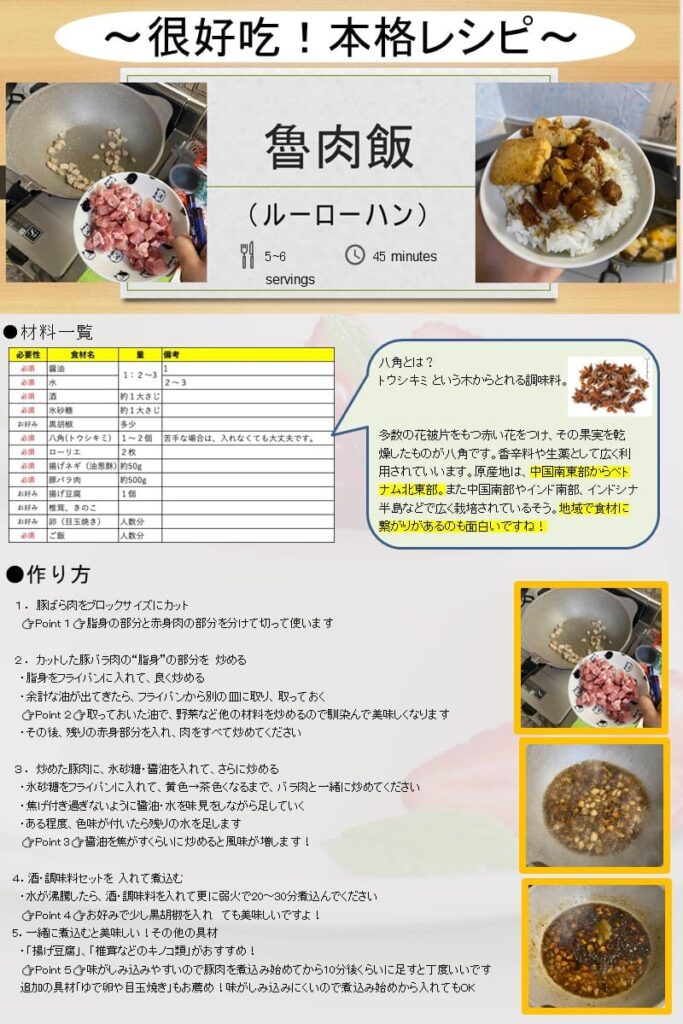
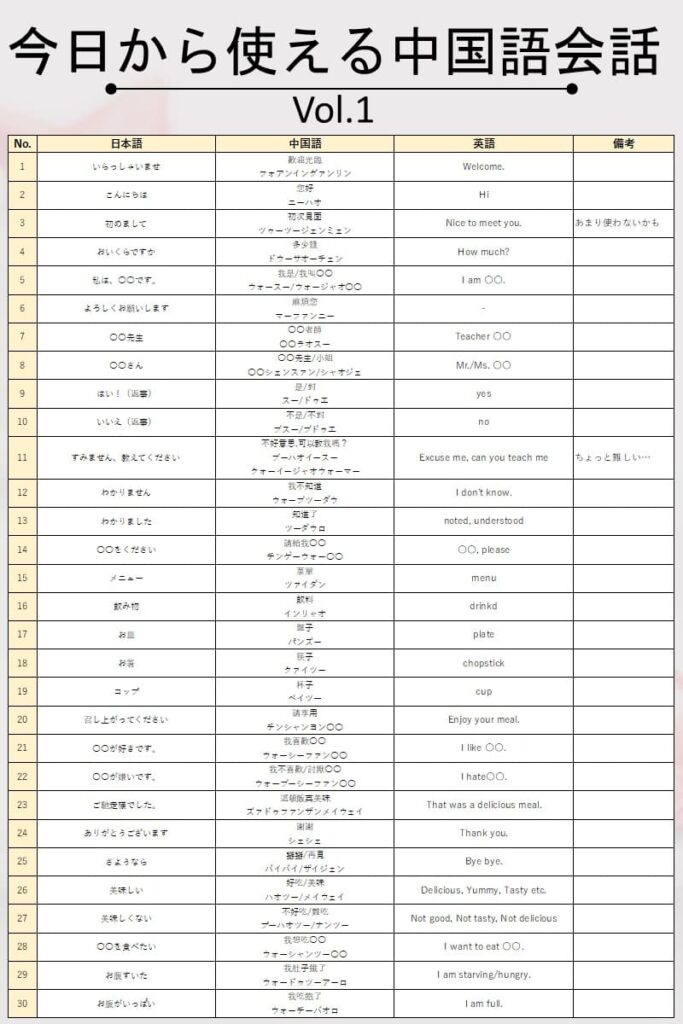
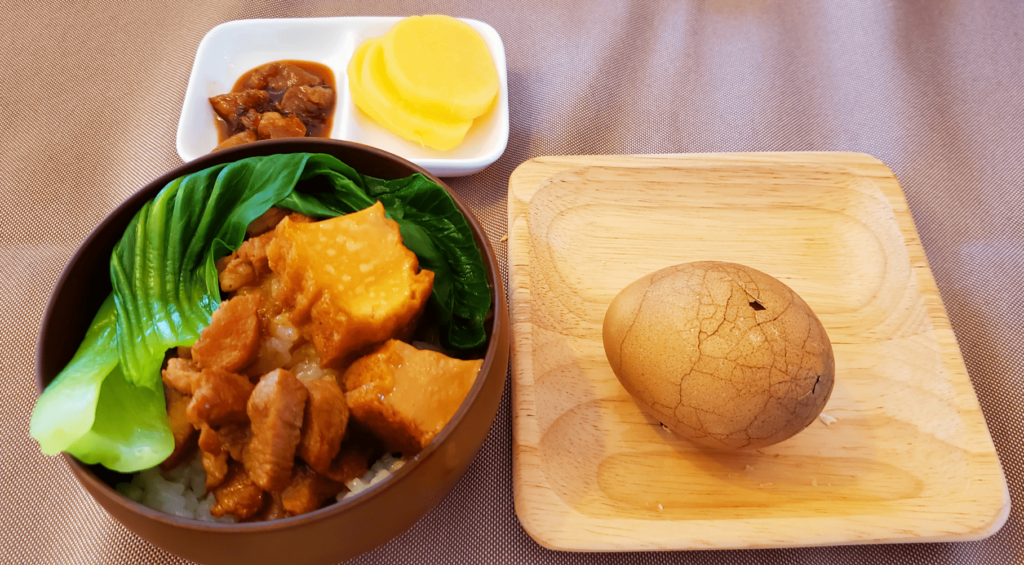
Now it’s time to taste the dish!
This time, Ms. Shi also specially prepared “Cha Ye Dan,” eggs that are eaten as a snack in Taiwan.
This egg is so famous in Taiwan that it is even sold in convenience stores, just like “Oden” in Japan.
It is similar to “Oden” in Japan.It was also delicious.
Also, Taiwanese snacks such as dried mangoes, watermelons, and sunflower seeds also were served with them.
“Watermelon seeds are a snack?”
It was a culture shock to learn that watermelon seeds are a snack, and also surprising to realize the size of the seeds.The seeds were so thin that it was difficult to take them out….

In China and Southeast Asia, eating watermelon seeds as a snack seems to be commonplace, and one participant told us that when he traveled there, he saw adults eating them on trains normally.
If you can eat watermelon seeds, you are as good as an Asian gourmet? (lol).

While eating Lu Rou Fan and snacks, the participants listened to the stories of the teacher’s global activities and stories of other participants, laughing at times, admiring at other times, and being stimulated by each other.
Despite the short time together, the conversation and the food were just like those in Taiwan.
It was a wonderful experience, as if we were all studying together before going on a trip.
The following are some of the comments we received after the workshop.
ワークショップが終了した後も、先生や残った方たちでゆっくりお話されていく方もいらっしゃいました。シ先生ありがとうございました。
第三回となる次回は、9月18日(日)「カンボジアってどんな国?聞いてみよう・食べてみよう」です。
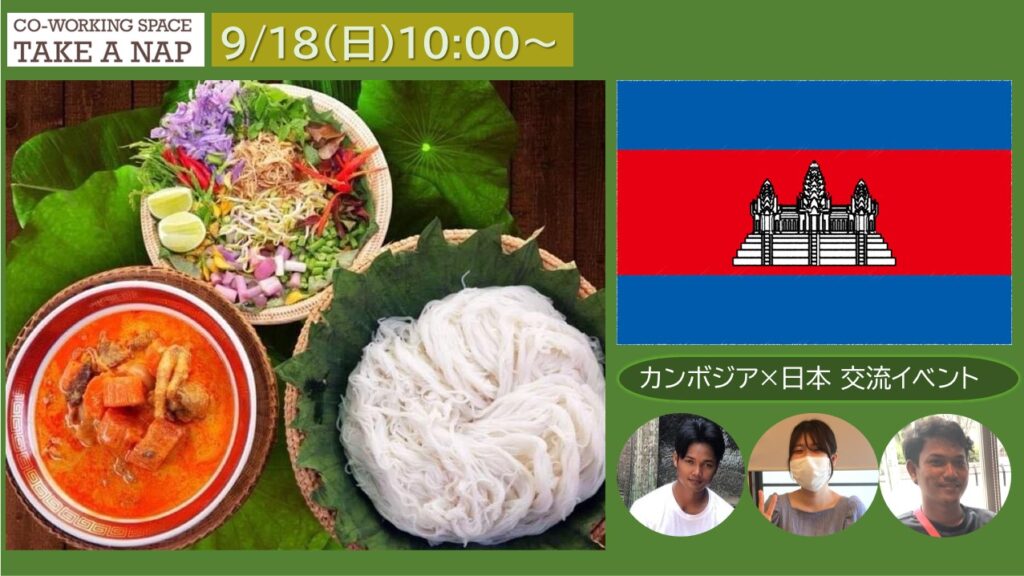
TAKE A NAP 9月(ワークショップ&交流会)のお知らせ – TAKE A NAP公式
「TAKE A NAP」では、今回のようなイベント・ワークショップを通して、ご利用いただく方の学びや仕事、挑戦へ一歩踏み出すためのきっかけ…そこまではいかなくても何かあそこであんなことやってたな、あの人が出来るんだから私もやってみようかな、くらいの楽しい思い出の場作りのお手伝いが出来ればと思っています。
グローバル化が進み、多様な働き方やライフスタイルが認知される昨今、個の尊重や地域のつながりの重要性がより意識されるようになってきていると感じています。明るく広がりを見せる世界に明るさと希望を感じる一方で、日々忙しい目先の日常だけに囚われて、ふとこれからの未来や将来がどうなるのか?社会に取り残されてしまうような、変わることへの漠然とした不安を感じたりする時も。1人でやるには、ちょこっと勇気がいるようなことも、先輩や仲間、何かを始める前にそっと背中を推してくれたり、気軽に相談ができる身近な人がいれば、もう少し気楽に関わったり、少しづつでも何か始められるかも。そんな誰かの挑戦や地域交流、変化へ気付くきっかけづくりのお手伝いが出来たらと、セレンディピティ※を意識した運営を行っています。
セレンディピティとは「偶然の出会いによる幸運、それを自ら引き寄せる力」
ワークショップでは、先生たち自身も初めて挑戦することをひとつ以上取り入れるようにお願いしていて、”完璧に仕上がったプロフェッショナル”ではなく、他の仕事や忙しい日々との合間に考えながらチャレンジしてくれています。先生たちのプロとしての一面に触れながら、いい意味での”拙さ”が醸し出す、個人としての”真摯さ”や”勇気”が身近に感じられる場。そこにセレンディピティを高めるヒントがあると考えています。(コワーキング利用中の方に試食やアドバイスをお願いしたり…シさん/打合せ中、子守をしてもらっていたお母様からアドバイスを頂いたり…クエちゃん)
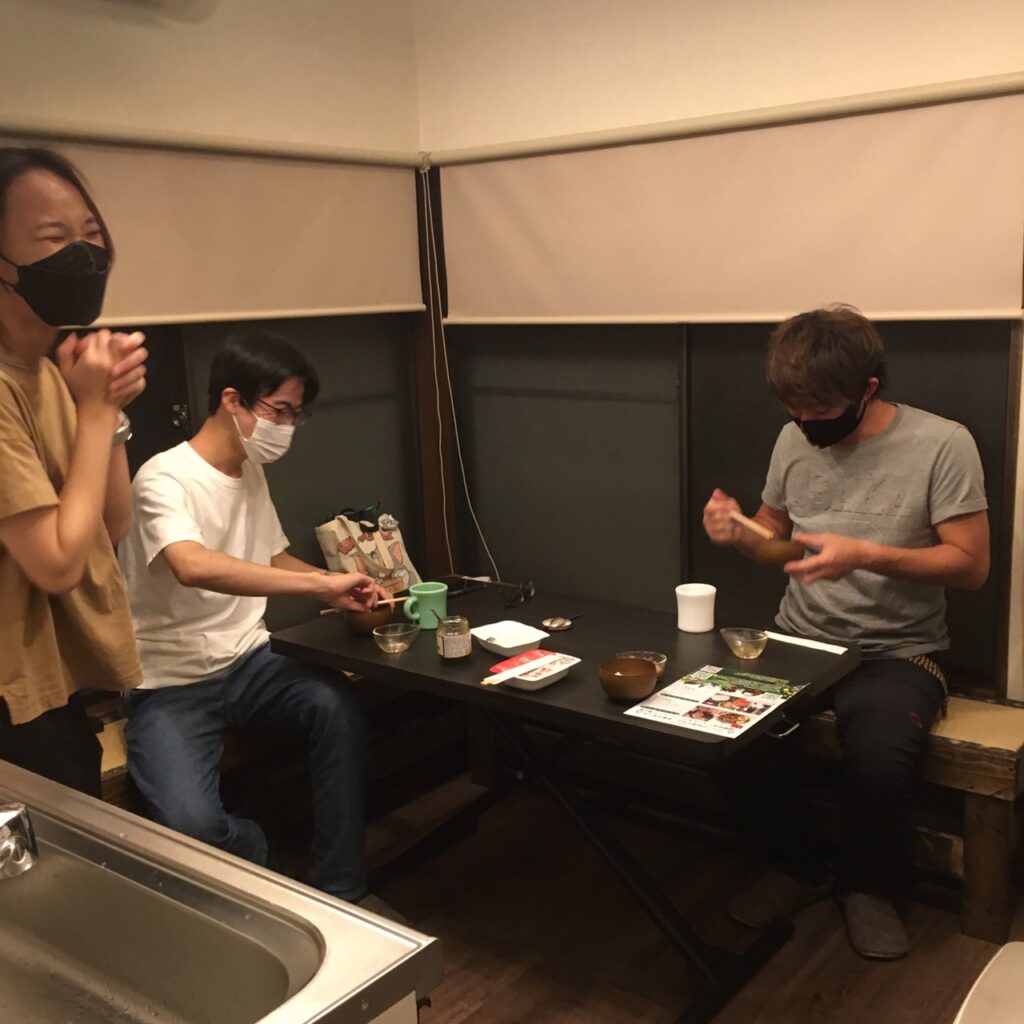
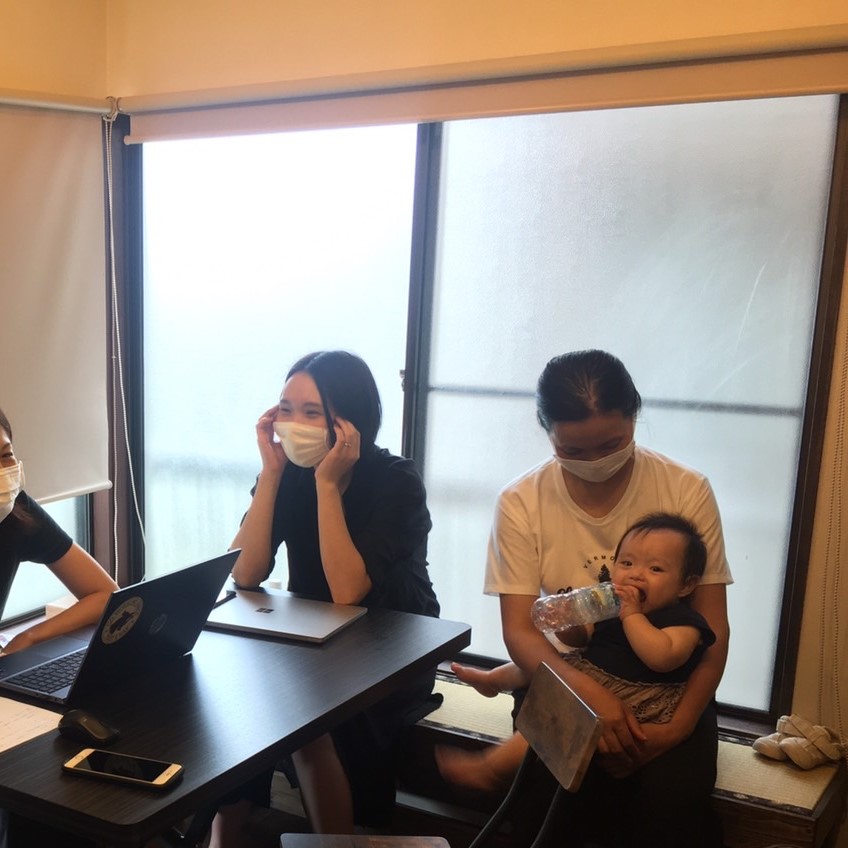
普段は仕事や学び、さらには子育てなど大変な日々。たまの週末に、普段は出会うことが無いような、新しいこと・世界・人や仕事に出会うことが出来る、そんなイベントを今後も開催していきます。
日常使いを頂くコワーキングスペースでは、板橋区や豊島区に住まわれている会員さんやご利用者の方が少しづつ集まり、たまに会員さん同士で挨拶する位のほどほどに良い距離感で、ご利用いただく方も増えてきています。気分転換やどうしても集中して作業をしたい時に、ちょっと近所に散歩がてら雰囲気を変えて集中したい時に、疲れた合間にホッと一息できる場所がある。そんなスペースです。
「TAKE A NAP」は、日々のお仕事や勉強の合間の休息も、長い1年や人生の合間の休息でも、ちょっと立ち寄ると幸せな出会いがある、そんな場所。今後のイベントやお知らせも是非ご期待くださいませ。
ご予約はこちらから



2/11 ラジオ(公開収録)観覧募集のお知らせ
EVENT&REVIEW
大山にあるお笑い劇場”シアター咲”とTAKE A NAPのコラボ企画第1弾。地域の方向けの”お笑いラジオ(無料公開収録)
VIEW MORE
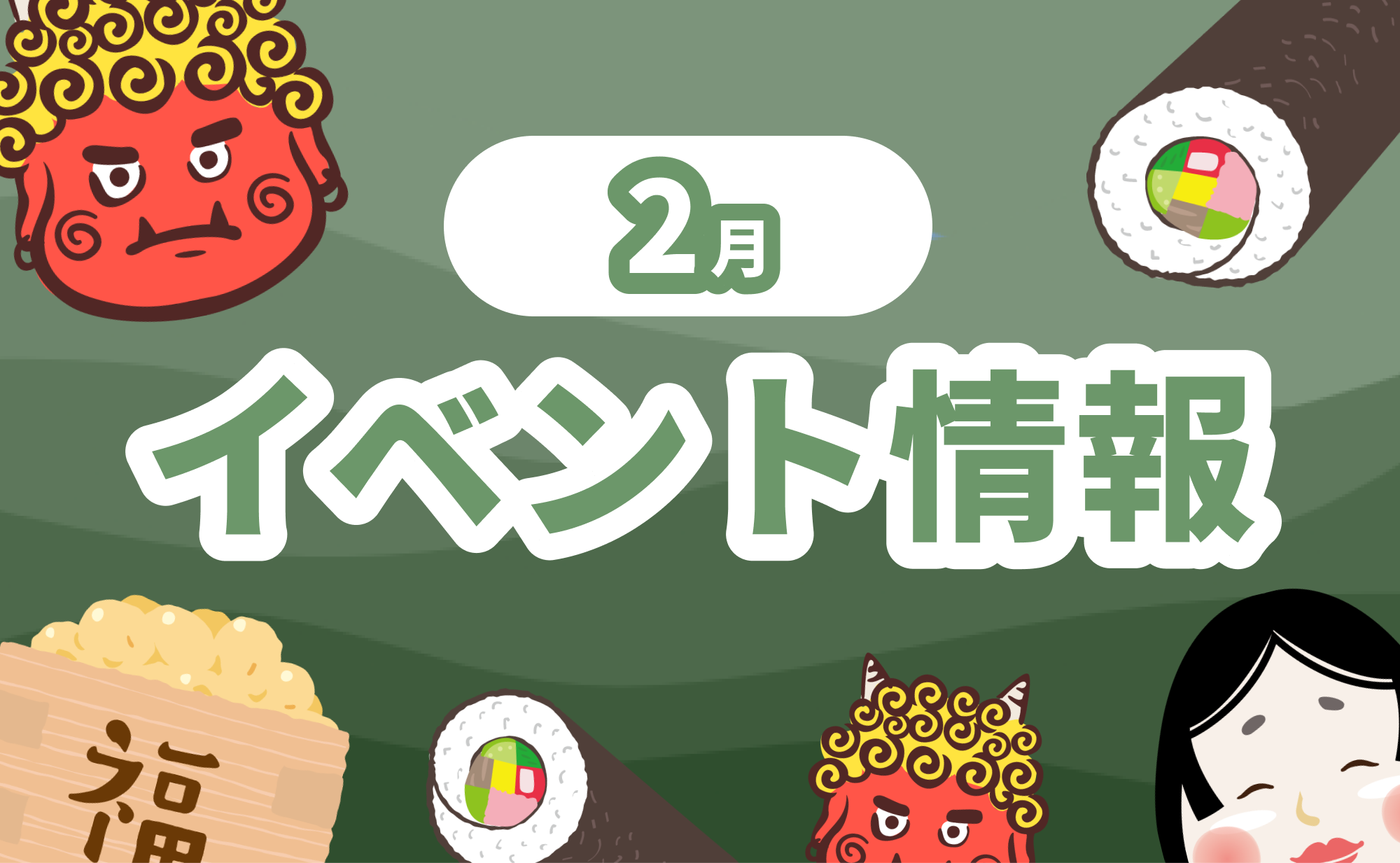
【2月】TAKE A NAP Special Contentsのご案内
EVENT&REVIEW
Special Contents のご案内 DIY工作体験 小枝で輪ゴムでっぽう作り 今回は、ものづくりやDIY、ハンド
VIEW MORE

2026年1月開催 みんなでつくるお正月
EVENT&REVIEW
フィリピンやベトナム、カンボジアなど様々な出身国の親子が集まり、年に一度、日本の昔遊びを楽しむイベントです。 イベント詳
VIEW MORE
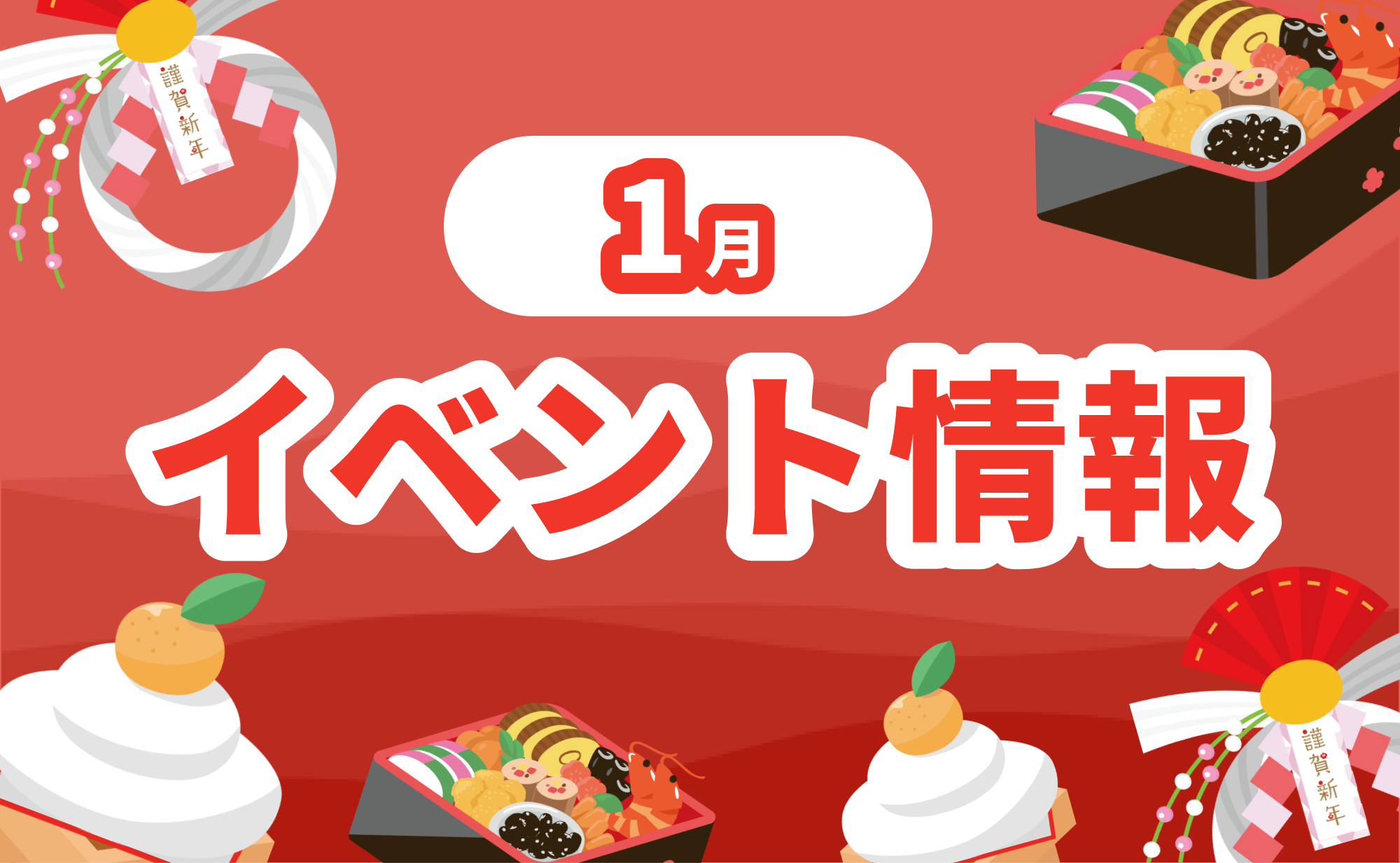
【1月】TAKE A NAP Special Contentsのご案内
NAP SCHOOL
Special Contents のご案内 みんなでつくるお正月 フィリピンやベトナム、カンボジアなど様々な出身国の親子
VIEW MORE